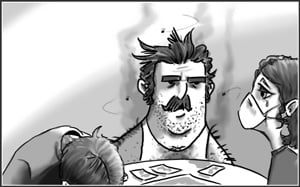
One of the best things about being in the boardgame hobby is how inclusive and accepting everyone is. Every time I play a game at conventions or new groups I’m playing with different races, religious beliefs, political beliefs, and it all works out great… usually. Every group has the potential to have one. A bad apple in the group can be someone who’s too loud, too smelly, or gets angry in games. They suck the fun out of the gaming experience.
SO HOW DO WE DEAL WITH SUCH INDIVIDUALS?
As I mentioned, we’re an inclusive bunch, and no one wants to upset that. Conflict is hard, and confrontation is even harder. Some of us just don’t have it in them to confront another person about their behavior, but if that person is hurting the group’s experiences, then the group can suffer for your silence. Here are some tips on how to confront these types of individuals without conflict.
 Personal Hygiene Issues
Personal Hygiene Issues
This is one of the hardest issues to bring up because normally, the player is a nice and fun person to be around, other than the smell. If you’re a little bit of a germaphobe like me, then you really have a problem with this situation.
I was being taught a game by someone at a convention earlier this year who clearly had a cold. The teacher kept coughing and hacking on her hand and then using that hand to pick pieces out of a bag to hand to us. There was no time in between either. Once, she coughed in her hand, rolled that hand into the bag to mix up pieces, pulled it out to cough on again, then reached in and pulled out a piece to hand to me. I’m not ashamed to say I left in the middle of the game. I apologized and just left.
In that situation at a convention, that’s the easiest thing to do is to leave, but you can’t do that when it’s your group. Aside from germs, there are also issues of smell and general cleanliness. You’re going to have to confront them. I find the best solution is to put the blame on yourself to remove as much shame as possible when speaking to them.
I have no problem talking about my “germaphobia” or “allergies to perfumes”. Even if they aren’t wearing deodorant or perfume that offends, pretending like they do and saying you’re having a reaction to it can cause them to consider their hygiene.
 Angry Players
Angry Players
In this category I’m lumping in the sore losers, mean winners, argumentative rule-bashers, and the angry, pushy players that tend to ruin games. These individuals have failed to realize or remember that we’re all here to have fun. There’s no gold medal at the end of it, but these players play like everything hinges on this game.
For them it does. A lot of times these players have their egos wrapped up in their achievements in gaming. If they lose, they feel like people don’t think they’re as smart as they really are. If they win, then they need recognition to feed their ego. Their self-worth is often in their performance.
The solution here is to redirect their forceful nature to the group’s benefit. These individuals need to feel important. They need to be seen as achieving something in front of everyone, so give them a task. Take them aside and explain to them that you’re afraid people aren’t having as much fun as they could. Don’t bring up their issues. Instead, ask what you both can do to improve the fun of the group.
Again, stay away from player bashing conversations. People always think it’s someone else’s fault in this situation. Try to give them a task that will both help the group and feed their ego. Maybe they can make snacks for the group. Maybe you could enlist them to help you organise events. Chances are, once you ask them to help improve the group, they have a list of ideas that can help.
Whatever the task, make sure it benefits the group and that the individual will get credit for it. Later, you can compliment them on the job they’re doing and talk about how the mood in the group has gotten lighter and more easy going. Ask them to help keep that attitude in the group. It will take hand-holding and interaction, but it can turn into a great benefit for your group if you nurture it properly.
THE DIRECT APPROACH
If you’re not afraid of conflict, or if these passive solutions aren’t working, you may eventually have to deal directly with the problem. Remember this:
- Don’t talk down about the person to others in the group.
- Don’t confront the person in front of anyone else.
- Allow them to save-face as much as possible, as long as the situation is resolved.
- Don’t attack their issue. Instead, come at the issue together for you both to do something to improve it.
- What you say should be to benefit the group, not give you satisfaction with the anger you’ve had over the situation.
Dealing with individuals who are different from you can be daunting. No one wants to be mean to another person, but the group has to come first. If you’re not able or willing to confront the individual, think of someone who’d be good with people in your group and ask if they can help. In the end, we’re all here to have fun, keep that in mind.








